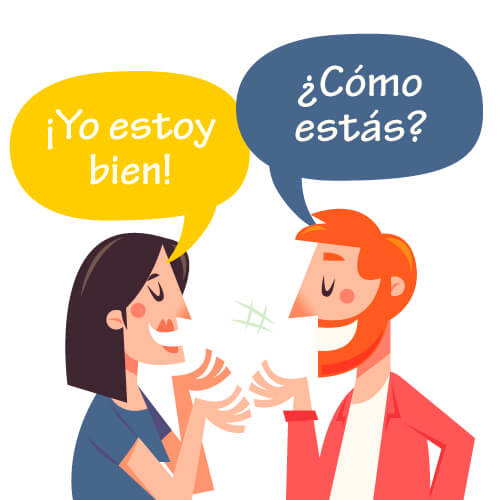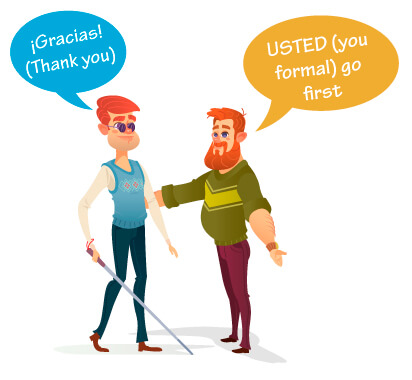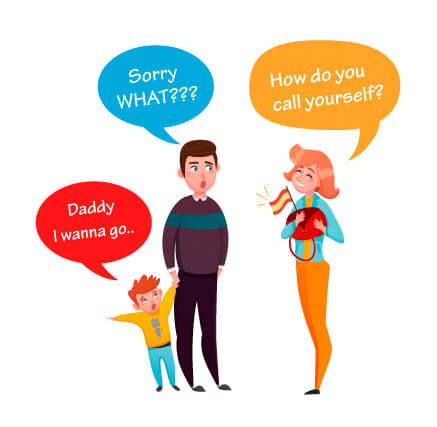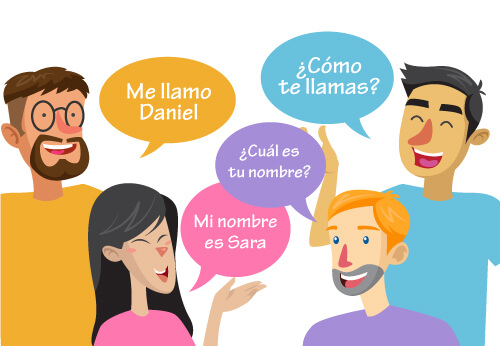How are you In Spanish
Imagine that you have just met a person that you do not know in a coffee shop. What will be the first thing that you’d say?
♥ HELLO!⇒HOLA!
HOLA!!! Of course, hi. After that, whether is in a polite atmosphere or in a casual meeting we would start our talking, greeting with:
Good morning ⇒ Buenos días
→morning from 00.00 am until 12.00 pm
Good afternoon ⇒ Buenas tardes
→afternoon from 12.00 pm until evening 9 pm
Good night ⇒ Buenas noches
→from 9.00 pm until midnight
Buenos, buenas…you might have noticed the different ending of BUEN-OS, BUEN-AS. You will be surprised knowing nouns, adjectives…so on, they have a gender. We Bet that you will even be more annoyed than surprised later on about that.
It is not the time yet to see the Gender of a word but it will be soon!
What now? How are you? We‘d say. Here it is:
First of all, and a very important thing, we are going to learn Spanish from our English knowledge. So basically it is going to be a game of copy-paste words adding our Spanish grammar rules if so.
¿CÓMO ESTÁS?
HOW ARE? (YOU) ?
Where is the pronoun you in Spanish? Well , in Spanish we conjugate every single person, so basically there is no need of using pronouns because the conjugated verb tells us who’s the person already…a little bit confusing. Let’s see that in a table:
ESTAR IS THE VERB TO BE TEMPORARY IN SPANISH
|
PERSONAL PRONOUN |
PRONOMBRE PERSONAL |
TO BE |
ESTAR |
|
I |
YO |
AM |
ESTOY |
|
YOU |
TÚ |
ARE |
ESTÁS |
|
YOU (FORMAL) |
USTED |
ARE |
ESTÁ |
|
HE |
ÉL |
IS |
ESTÁ |
|
SHE |
ELLA |
IS |
ESTÁ |
|
WE |
NOSOTROS |
ARE |
ESTAMOS |
|
YOU(ALL) |
VOSOTROS |
ARE |
ESTÁIS |
|
YOU (ALL FORMAL) |
USTEDES |
ARE |
ESTÁN |
|
THEY (MASCULINE) FOR GUYS |
ELLOS |
ARE |
ESTÁN |
|
THEY (FEMININE) FOR GIRLS |
ELLAS |
ARE |
ESTÁN |
◊ Formal and Non formal You Pronoun (singular and plural) we will see it in the next section.
→ As you can see in the table, every single Spanish person is different in the conjugation:
ESTOY, ESTÁS, ESTÁ, ESTAMOS, ESTÁIS, ESTÁN, so, the SUBJECT PRONOUN (Yo, Tú, Él, Ella, Nosotros, Vosotros, Ellos, Ellas) IS NOT NECESSARY because is already known due the verb conjugation.
In English Instead, we do have only three different conjugations. AM, ARE, IS,ARE, ARE, ARE. Therefore, the Personal pronoun (I, You, He, She, We, You, They) must be told.
Let’s see it again:
¿CÓMO ESTÁS?
HOW ARE ? (YOU)
YO ESTOY BIEN
I AM FINE
Are you always fine? We hope so, but being always okay is rather difficult. Then:
YO ESTOY MAL
I AM BAD
YO ESTOY MÁS O MENOS
I AM SO SO

You non-formal Vs You formal in Spanish
We are going to see the common you (tú) and the formal you (usted), in its singular (tú, usted) and plural (vosotros, ustedes) mode.
Basically, we do have a personal pronoun to talk to a second person, you, (the person is talking to us), in a respectful manner. Is this important?
Yes, it is. In a job interview, talking to an old person, in a specific job meeting, so on… we do have to use the formal way.
However, Spaniards (people from Spain) are not really comfortable with the polite form. So as soon as they can, they try to switch this polite form (Usted, Ustedes) into a normal form, non polite you (tú, vosotros). Why is it so?
→ Talking to somebody in a formal way makes them feel that the communication is not equal.Spaniards like to talk from the same position, not having the feeling that somebody has a higher or a lower status, a different position, with an older or younger age and so on… This is a very cultural thing in Spain.
They even have a verb for switching the conversation from a formal into a non formal form (tutearse).
◊ This is very different in Latin-American Spanish. Most of the countries use the formal way even when they are talking to a close friend. Also a very cultural thing. What is better?
It depends basically where your Spanish is gonna be used. However, using a non-formal Spaniard way of talking when in America is completely fine and vice versa.
But remember that there are scenarios where the polite form must be used!
Let’s see it grammatically:
|
|
PERSONAL PRONOUN |
PRONOMBRE PERSONAL |
ESTAR (TO BE) |
|
NON FORMAL |
YOU |
TÚ |
ARE ⇒ ESTÁS |
|
FORMAL |
YOU |
USTED |
ARE ⇒ ESTÁ |
|
NON FORMAL |
YOU (ALL GUYS) |
VOSOTROS |
ARE ⇒ ESTÁIS |
|
FORMAL |
YOU (ALL GUYS) |
USTEDES |
ARE ⇒ ESTÁN |
Let’s see in an easier explanation:
When talking to the person in front of you, you can use tú (you non-formal), conjugating the verb in second person as we do in English. You are⇔Tú estas.
Or when talking to the person in front of you, you can use usted (you formal), conjugating the verb in third person. It does not exist in English. You are ⇔ Usted Está.
♣ It is the same for plural mode…Ustedes (you all).
When talking to a few or many persons in front of you, you can use vosotros (you all non-formal), conjugating the verb in second person plural as we do in English. You (all) are ⇔ Vosotros estáis
When talking to a few or many persons in front of you, you can use ustedes (you all formal), conjugating the verb in third person. It does not exist in English. You are ⇔ Ustedes Están.

What is your name in Spanish
Is time to ask the other person’s name. For this matter, we have our very own Spanish expression. Let’s see:
¿CÓMO TE LLAMAS?
HOW DO YOU CALL YOURSELF?
(WHAT’S YOUR NAME?)
This is it. In Spanish, to ask another person’s name we ask this weird expression. How do you call yourself? Well, it does make sense in a way.
First of all, we need to tell you that grammatically speaking is a complicated expression. It is what we call a reflexive verb. It is not time to study reflexive verbs yet, so we are gonna start using it without understanding the sentence completely.
Let’s see the conjugation:
|
SUBJECT PRONOUN |
TO CALL ONESELF |
LLAMARSE |
|
YO ⇔ I |
CALL MYSELF |
ME LLAMO |
|
TÚ ⇔ YOU |
CALL YOURSELF |
TE LLAMAS |
|
USTED ⇔ YOU(FORMAL) |
CALL YOURSELF |
SE LLAMA |
|
ÉL/ELLA ⇔ HE/SHE |
CALLS HIMSELF/HERSELF |
SE LLAMA |
|
NOSOTROS ⇔ WE |
CALL OURSELVES |
NOS LLAMAMOS |
|
VOSOTROS ⇔ YOU (ALL) |
CALL YOURSELF |
OS LLAMÁIS |
|
USTEDES ⇔ YOU (ALL) FORMAL |
CALL YOURSELF |
SE LLAMAN |
|
ELLOS/ELLAS ⇔ THEY (GUYS)/THEY (GIRLS) |
CALL THEMSELVES |
SE LLAMAN |
Therefore:
¿CÓMO TE LLAMAS?
HOW DO YOU CALL YOURSELF?
YO ME LLAMO SARA
I CALL MYSELF SARA

Telling my name in Spanish
We have seen our very own expression Cómo te llamas?, but, yet we have the same way of asking what’s your name?… as we do in English (with the difference of the interrogative pronoun What).
Both are correct and can be answered in any way.
Let’s see:
¿CUÁL ES TU NOMBRE?
WHICH IS YOUR NAME?
There are many things that must be analyzed in this question:
- Notice: instead asking What we use Which.
- Observe the verb To Be: IS ⇒ ES? We have seen when asking How are you? ⇒ Cómo estás?, the verb To Be, should be Estar conjugated in 3rd person for IS ⇒ ESTÁ. Then?
→ We have 2 verbs To Be in Spanish. SER / ESTAR. How do we know when we have to use each of them? We will know as we learn Spanish.
♠ Just a little clue.:
SER (TO BE)⇒USED WHEN IS A PERMANENT ACTION
ESTAR (TO BE)⇒USED WHEN IS A TEMPORARY ACTION
- we have seen in the previous section, Tu as You. Not!!! We have seen TÚ. Therefore:
→ TÚ with an accent mark is the personal pronoun YOU
→ TU without accent mark is the possessive adjective YOUR
There is no difference between both pronunciations because of the accent mark. It just tells us whether it is YOU or YOUR when writing.
◊ We will see the possessive adjectives in the following section.
Just let’s see the singular form to be able to answer:
MY ⇔ MI
YOUR ⇔ TU
HIS/HER ⇔ SU
Therefore:
¿CUÁL ES TU NOMBRE?
WHICH IS YOUR NAME?
MI NOMBRE ES DANIEL
MY NAME IS DANIEL

Possessive adjectives (My, your, his/her, our, your, their) in Spanish
We have seen a little introduction of possessive adjectives (my , your, his/her) in the previous section. We are going to see the plurals as well.
Let’s the table:
Adjetivos posesivos ⇔ Possessive adjectives
|
|
SINGULAR |
PLURAL |
|
MY |
MI |
MIS |
|
YOUR |
TU |
TUS |
|
HIS/HER |
SU |
SUS |
|
OUR |
NUESTRO |
NUESTROS |
|
FEMININE |
NUESTRA |
NUESTRAS |
|
YOUR |
VUESTRO |
VUESTRA |
|
FEMININE |
VUESTROS |
VUESTRAS |
|
THEIR |
SU |
SUS |
What’s your last name in Spanish
When you meet a new person, it is not really normal to ask the last name, but, eventually and it depends where you are (like an interview) it can be a normal thing. Let’s see:
Remember the given name:
¿CUÁL ES TU NOMBRE?
WHICH IS YOUR NAME?
MI NOMBRE ES SARA
MY NAME IS SARA
Therefore:
¿CUÁL ES TU APELLIDO?
WHICH IS YOUR LAST NAME?
MI APELLIDO ES GONZALEZ
MY LAST NAME IS GONZALEZ
